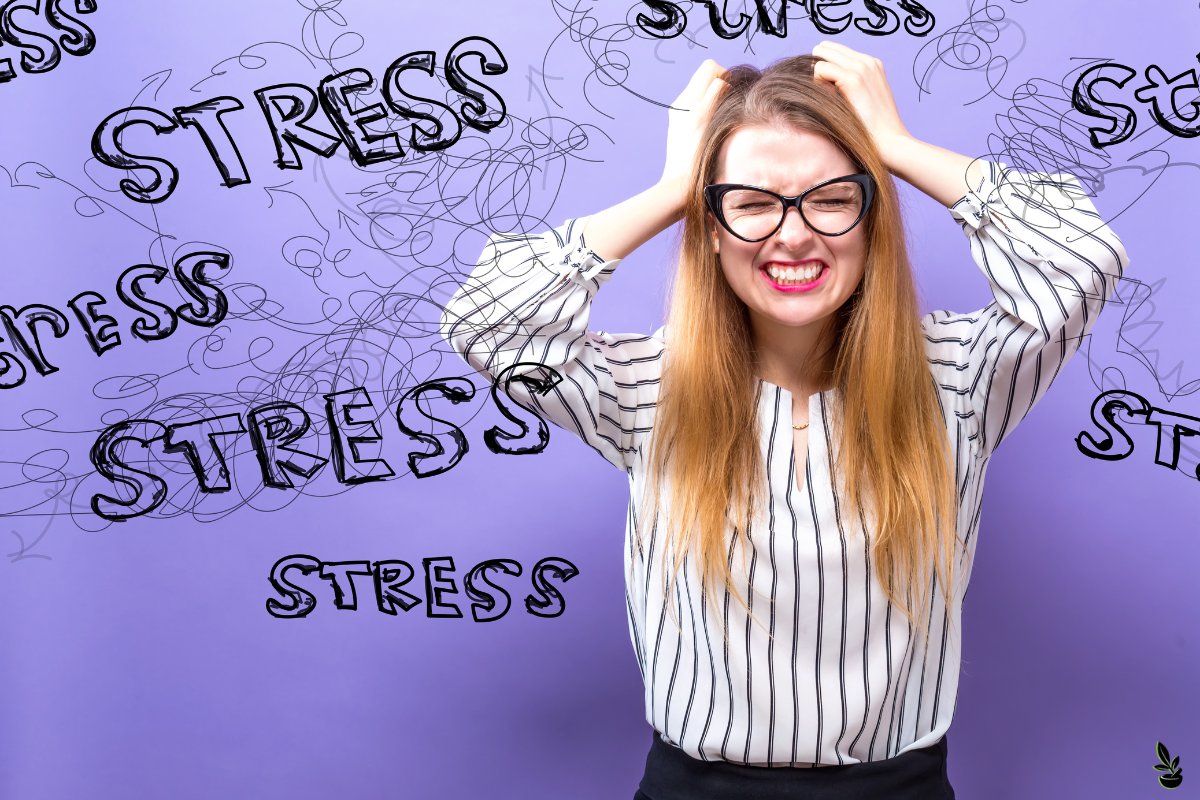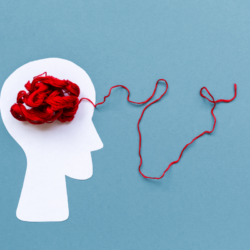Anxiety and stress are relatively common conditions these days, with significant repercussions on our health. The term ‘anxiety’ is commonly used to describe an unpleasant, negative and disproportionate emotion when faced with a situation perceived as threatening.
From a general point of view, the term anxiety, whose Latin etymology means “narrowness”, is defined as a narrowing of the world of the person concerned associated with perpetual worry. More precisely, anxiety corresponds to a notion of uncertainty and nervous tension in the face of a forthcoming event. However, it is difficult for individuals to precisely define their emotional state during an anxiety episode. Anxiety can be short-lived and transient as well as permanent or chronic.
Anxiety and stress require special treatment, with a range of therapies available. These days, the allopathic therapeutic arsenal is extensive but not without undesirable effects.
What is anxiety?
Anxiety is a normal emotion in the face of daily stress, to which people respond by mobilising their physiological and psychological resources. It is therefore a factor in adapting to situations of danger and urgency (aggression, performance, tests). It becomes pathological when it becomes painful, uncontrollable, disabling or even paralysing. The subject can no longer control the situation and his or her resources become insufficient to cope with the event. This is known as major anxiety, when the normal limit is exceeded and the condition becomes pathological.
There are two terms used to describe worry in French: “anxiété” or “angoisse”. Anxiety is more commonly used in the medical world, while angoisse is more commonly used philosophically. However, the two terms differ slightly. Unlike anguish, which is a fear of nothing, with no object, anxiety focuses on an object or event. An anxious person is unable to detach themselves from their “stressor” and therefore unable to control themselves. Anxiety develops in three stages: first the symptomatic stage, then the syndrome stage and finally the disorder stage.
A symptom is a clinical sign, a syndrome a structured set of symptoms and finally the term disorder is used to describe the disability situation in question.
The repercussions of anxiety on the body
Anxiety and stress affect the body in different ways. A stressful situation leads to biological responses that can be harmful to humans. These consequences can be classified in different categories: emotional and somatic consequences , with the appearance of harmful disorders localised in tissues or organs.
Emotional component :
The emotional component is heavily involved in these pathologies, leading to changes in the psyche in the event of anxiety. This can lead to sadness or emotional withdrawal, as well as irritability, hostility or aggression, all of which can be direct consequences of anxiety-related pathologies, whether anxiety or stress. Stress can also lead to the development of anxiety.
Somatic component:t
Stress and anxiety disorders can take different clinical forms.
The somatic complaints described are generally specific to each type of anxiety. For example, the most common reactions to a panic attack are tachycardia, palpitations, sweating, chest tightness, precordial pain, dizziness, malaise and paresthesia. In the case of generalised anxiety, the repercussions will be relatively different, with insomnia in particular.
Somatoform disorders are also used to describe these somatic symptoms, which are psychogenic in nature and origin.
It should be noted that in the elderly, the expression of anxiety is often atypical, explained in particular by difficulty in expressing oneself.
Psychosocial aspects of anxiety
The psychosocial sphere, often underestimated in the analysis of anxiety, deserves particular attention. The repercussions of anxiety transcend the individual and permeate his or her social and professional life, often in an insidious and profound way.
Impact on social and professional life
In social terms, anxiety can manifest itself as a tendency to avoid. Social interactions, group activities and even outings with friends become potential sources of stress, leading to progressive isolation. In terms of interpersonal relationships, anxiety can impair the ability to establish or maintain bonds, sometimes leading to misunderstandings or hasty judgements, as the anxious state can be misinterpreted as disinterest or hostility.
In the professional environment, anxiety has a direct impact on performance. In particular, chronic anxiety can impair concentration, decision-making and time management, reducing efficiency and increasing the risk of errors. In addition, fear of judgement can inhibit participation in meetings or presentations, limiting opportunities for career development. This situation creates a vicious circle where anxiety hinders performance, which in turn increases anxiety.
Influence of the social and family environment
The social and family environment plays a major role in the development of anxiety. A conflictual family climate, unrealistic expectations and poor communication can sow the seeds of anxiety in childhood. These environmental factors, combined with genetic predisposition, can increase susceptibility to anxiety.
Similarly, social support is a crucial factor in managing anxiety. The presence of a benevolent support network can provide a counterbalance to internal tensions. Conversely, a lack of support or exposure to hostile or competitive social environments can exacerbate anxiety symptoms.
So the question is: how can we cultivate an environment that is conducive to reducing anxiety? The answer is to foster a culture of openness in which the expression of emotions is encouraged and not stigmatised, to promote healthy communication within the family and social circles, and to ensure that recognition and appreciation at work take mental health into account.
Anxiety and PVM mitral valve prolapse
Mitral valve prolapse (MVP) is a relatively common heart condition in which one or both of the heart’s valves do not function properly. Specifically, PVM occurs when the leaflets (or “valves”) of the mitral valve do not close properly, causing an abnormal displacement (or “prolapse”) into the left atrium when the ventricle contracts.
PVM can be asymptomatic, but in some cases it can cause palpitations, chest pain, fatigue, dizziness and shortness of breath. In addition, some people with PVM may also suffer from anxiety.
Anxiety can be a secondary symptom of PVM, but it can also be a psychological response to the diagnosis of PVM. It is common for people with heart disease to develop anxiety due to concerns about their condition and the possibility of future heart complications.
In some cases, anxiety can also worsen symptoms of PVM. Symptoms of anxiety, such as increased heart rate and blood pressure, can exacerbate symptoms of PVM such as palpitations and chest pain. It is therefore important for people with PVM and anxiety to manage their anxiety effectively.
Some homeopathic treatments to combat anxiety
In the quest for well-being and serenity, homeopathy offers a range of remedies adapted to various symptoms of anxiety, personalising treatment according to each individual’s specific symptoms. Here are some commonly used strains, their specific indications, and the recommended dosage for homeopathic treatment of anxiety disorders.
Gelsemium 15CH
Gelsemium 15CH is often cited in the treatment of anxiety linked to anticipation. This homeopathic strain is reputed to relieve symptoms such as feelings of paralysis due to fear, feelings of numbness, dizziness, involuntary trembling, emotional diarrhoea and polyuria (excessive production of urine), often linked to stress.
Recommended dosage: 5 granules in the morning and evening, with the option of repeating as necessary or taking 1 dose the day before and 1 dose one hour before the stressful event.
Ignatia amara 15CH
Ignatia amara 15CH is highly acclaimed for its action on paradoxical behaviour and sensory hyperaesthesia. This strain targets cardiac disorders such as palpitations and various spasms, such as a lump in the throat, abdominal spasms and other somatic manifestations of repressed emotion.
Recommended dosage: 5 granules in the morning and evening, adjusted as required.
Argentum nitricum 15CH
Argentum nitricum 15CH is intended for people who are subject to agitation and haste, and who seem to want to complete their tasks before they have even started. It is indicated for subjects with a tendency to diarrhoea, belching and a paradoxical desire for sugar, which exacerbates their digestive problems.
Recommended dosage: Take 5 granules of Argentum nitricum in the morning and evening, and repeat if necessary.
Nux vomica 15CH
Nux vomica 15CH is suitable for cases of irritability, anger, aggressiveness and digestive spasms in a context of intellectual overwork and excessive consumption of stimulants such as coffee or alcohol.
Recommended dosage: 5 granules of Nux vomica in the morning and evening, with the option of repeating if necessary.
Staphysagria 15CH
Staphysagria 15CH is recommended for emotional states resulting from frustration, feelings of injustice or repressed anger.
Recommended dosage: 1 dose of Staphysagria per day for 3 days. For long-term use, take 5 granules morning and evening.
Aconitum napellus 30CH
Aconitum napellus 30CH is recognised for its effectiveness in cases of sudden and intense panic attacks, oppressive sensations of heart palpitations, and extreme anxiety which can go as far as fear of death.
Recommendeddosage: 1 dose, repeated every half hour as required.







